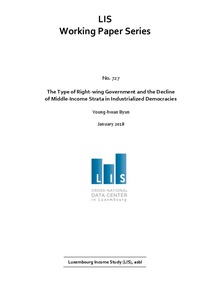The type of right-wing government and the decline of middle-income strata in industrialized democracies
"Although the decline of middle-income strata (or polarization in income distribution) is an increasingly widespread phenomenon across industrialized democracies, it remains understudied compared to other forms of income inequality. I analyzed the decline of middle-income strata among 18 indust...
| Main Author: | |
|---|---|
| Institution: | ETUI-European Trade Union Institute |
| Format: | TEXT |
| Language: | English |
| Published: |
Luxembourg
2018
LIS |
| Subjects: | |
| Online Access: | https://www.labourline.org/KENTIKA-19399574124911177569-The-type-of-right-wing-governm.htm |
| Summary: | "Although the decline of middle-income strata (or polarization in income distribution) is an increasingly widespread phenomenon across industrialized democracies, it remains understudied compared to other forms of income inequality. I analyzed the decline of middle-income strata among 18 industrialized democracies between 1971 and 2010. Whereas previous research claimed that income polarization is a common development, brought upon by global market integration or skill-biased technological change, I found significant cross-country variation in the extent of polarization among the 18 cases. My findings suggest that that the type of party government—in particular, whether the dominant right-wing party is Christian or secular—is associated with divergent outcomes in the degree of income polarization. I argue that secular-right governments have facilitated income polarization by undermining centralized wage-bargaining and social-insurance benefit generosity. In contrast, by maintaining these institutional arrangements, Christian Democratic governments have tempered polarization trends in the market, resulting in relatively larger middle-income strata." |
|---|---|
| Physical Description: | 36 p. Digital |

